In The Reichenbach Fall it’s Moriarty’s turn to show off, Watson’s turn to show up Mycroft, Molly Hooper’s turn to matter most, and Sherlock’s time to see he does have more than one friend in the world—so of course it’s a showstopper from beginning to end. However things start out with a rather grave announcement: Sherlock Holmes is dead. It must be true because Watson is saying it. Actually he can’t quite bring himself to say all of the words aloud—probably why he’s back in therapy. But they’re skipping ahead here, so let’s go back to the chronological beginning.

Since the Reichenbach case—another of the passing references to Conan Doyle’s stories used as cases in name only, recall The Speckled Blonde—Sherlock has been inching up his fame from viral internet legend to household name. It’s not just Watson writing about their exploits anymore, these days they’re all over the papers courtesy of press conferences thrown by grateful clients. Scotland Yard even gave Sherlock credit on a case, though possibly that was a joke—one that afforded them the opportunity to give him a tweed ear-flapped cap, just like the one in his famous photo, in circumstances that would force him to wear it publicly. Watson is concerned about the consequences of Sherlock’s status as a media darling. “The press will turn, Sherlock,” he warns, “they always turn and they’ll turn on you.”
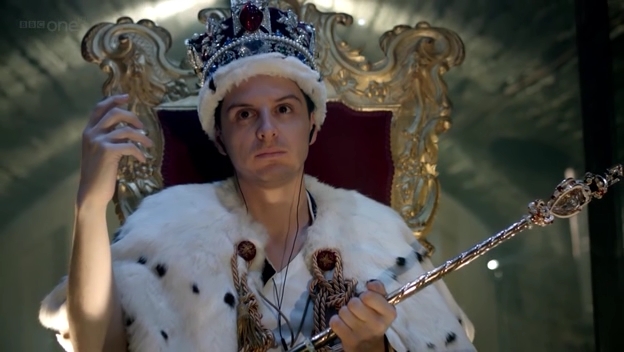
Meanwhile Moriarty has decided it’s finally time to take down Sherlock and clearly he’s intent on keeping his promise to make it special. Well, if you call breaking into the Tower of London and donning the crown jewels, in broad daylight and amongst other crimes, special. He doesn’t try to make off with his loot, but uses his trial as phase one in his campaign to make Sherlock as despised as he ever was admired. Sherlock is set to provide crucial evidence at the trial and Watson, though he hasn’t caught out Moriarty’s ruse, knows his friend well enough to be worried about the myriad potential problems posed by such testimony.
“Remember what they told you,” says Watson. “Don’t try to be clever.”
“No,” says Sherlock, as though he’s paying attention.
“And please, just keep it simple and brief.”
“God forbid the star witness at the trial should come across as intelligent.”
“Intelligent, fine,” says Watson. “Let’s give smartarse a wide berth.”
“I’ll just be myself,” says Sherlock.
“Are you listening to me?” asks Watson, with great incredulity.
The trial is uneventful outside of Sherlock being jailed for contempt. This is what happens once you take the stand and anticipate the prosecutor, judge, and jury, you know, out loud…and without interruption. “How long have I known him? Not really your best line of inquiry. We met twice, five minutes in total. I pulled a gun, he tried to blow me up. I felt we had a special something.” Moriarty’s lawyers make no attempt to discredit him, which bothers Sherlock more than anything else. After his release he’s back at the flat pacing and puzzling it out.
“You are doing the look again,” complains Watson.
“I can’t see it, can I?” says Sherlock, acting surprised and then checking the mirror. “It’s my face.”
“Yes, and it’s doing a thing,” insists Watson. “You’re doing a ‘We both know what’s really going on here’ face.”
“Well, we do.”
“No, I don’t,” says Watson, “which is why I find the face so annoying.”
“If Moriarty wanted the jewels, he’d have them,” Sherlock says. “The only reason he’s still in a prison cell right now is because he chose to be there. Somehow this is part of his scheme.”
Moriarty must not want to be in jail for long because even though he mounts no defense the jury returns as quick as you like and he’s acquitted of all charges. Then, still in his lovely trial suit, he turns up at Baker Street. Sherlock, anticipating the confrontation, puts the kettle on.
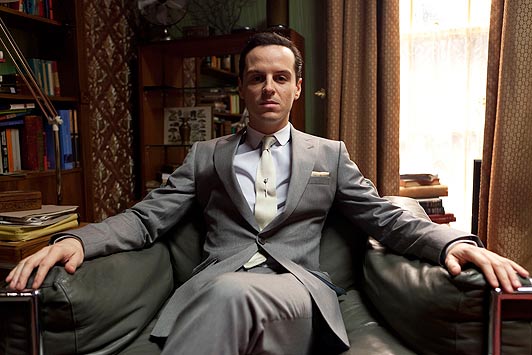
He sits in Sherlock’s chair, not Watson’s. “Every fairytale needs a good old fashioned villain,” says Moriarty, reminding Sherlock of how well they compliment each other. He explains how he secured his not guilty judgment. But that’s just flirting. He’s there to discuss The Final Problem, which is of course the title of the Conan-Doyle story this episode is based upon. “So how are you going to do it, burn me?” Sherlock asks. But Moriarty deflects. He’s still got some showing off to do. He wants Sherlock to recap his illustrious crimes and to prove he knows why Moriarty’s done it all the way he has and Sherlock obliges.
“What is it all for?” asks Sherlock.
“I want to solve the problem, our problem, the final problem,” says Moriarty. “It’s gonna start very soon, Sherlock, the fall. But don’t be scared. Falling’s just like flying except there’s a more permanent destination.”
“Never liked riddles,” says Sherlock.
“Learn to. Because I owe you a fall, Sherlock. I…owe…you.”
But soon comes and goes and nothing happens, except Moriarty disappears. Oh and Mycroft abducts Watson, again—this time to inform him that four top international assassins have lately moved to Baker Street.
“We both know what’s coming, John,” Mycroft says. “Moriarty is obsessed. He’s sworn to destroy his only rival.”
“So you want me to watch out for your brother because he won’t accept your help,” says Watson.
“If it’s not too much trouble.”
The warning couldn’t have come at a more opportune time. As soon as Watson gets back to the flat he sees Lestrade has brought Sherlock a new case, a kidnapping, some high-ranking official’s children. We follow along as they collect information, like it’s a normal case, but Sherlock knows better. He heads to St. Bartholomew’s with the evidence and they catch Molly leaving for lunch.
“Need your help. It’s one of your old boyfriends,” says Sherlock. “We’re trying to track him down. He’s been a bit naughty!”
“It’s Moriarty?” Watson asks.
“Of course it’s Moriarty.”

He’s busy examining his samples and, as is her wont, Molly is busy studying him. She’s not particularly articulate on the subject of Sherlock, but she’s had more practice than most in observing him. She tells him that lately he reminds her of her father when he was dying, how cheerful he was unless he thought no one was looking. It’s how Sherlock looks when he thinks Watson can’t see him.
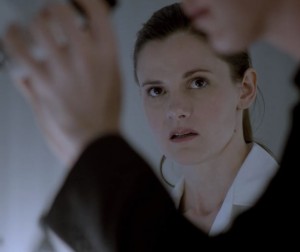 “Are you okay?” Molly asks. “Don’t just say you are because I know what that means, looking sad when you think no one can see you.”
“Are you okay?” Molly asks. “Don’t just say you are because I know what that means, looking sad when you think no one can see you.”
“You can see me,” says Sherlock, still intently focused on the lenses of the microscope in front of him.
“I don’t count. What I’m trying to say is that, if there’s anything I can do, anything you need, anything at all, you can have me.” Molly pauses to compose herself. “No, I just mean…I mean…if there’s anything you need—it’s fine.”
“But what could I need from you?” asks Sherlock, his confusion sounding an awful lot like condescension.
“Nothing. I don’t know. But you could probably say thank you, actually.”
Sherlock has been receiving this suggestion from Watson a lot lately, so despite his bewilderment he goes for it. “Thank you.”
Of course Sherlock finds the children, but that’s part of Moriarty’s plan too. The little girl recognizes him and screams her head off and little by little, with significant nudging from Anderson and Donovan, Sherlock is discredited within Scotland Yard for having solved the case too easily—in other words he must have staged it himself. And once this theory catches on all of the cases he’s consulted on fall under scrutiny. Lestrade doesn’t buy it, but he’s ordered to bring Sherlock in. “One photograph—that’s his next move,” says Sherlock, “Moriarty’s game: first the scream, then a photograph of me being taken in for questioning. He wants to destroy me inch by inch. It is a game, Lestrade, and not one I’m willing to play.” They come back in full force to arrest Sherlock. Even the Chief Superintendent is there—he calls Sherlock a vigilante and says he looks like a weirdo. Then Watson is under arrest as well and they’re being handcuffed together.
“Joining me?” asks Sherlock.
“Yeah,” says Watson. “Apparently it’s against the law to chin the Chief Superintendent.”
“Hmm. Bit awkward, this.”
“Huh. No-one to bail us,” says Watson.
“I was thinking more about our imminent and daring escape.”
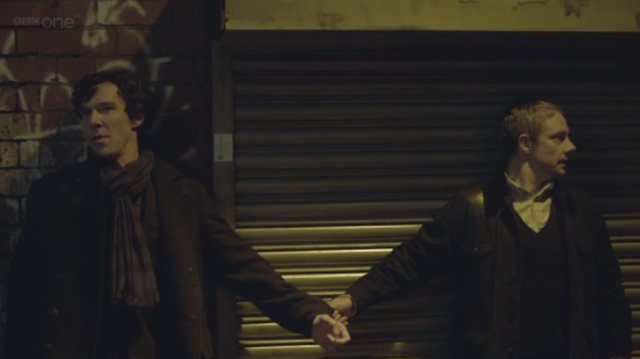
Oh yes they do. Like I said, action packed. So much so that I’m leaving out a lot. But I wasn’t that impressed with Kitty Riley, girl reporter, or her source Richard Brook—necessary to the plot as they are. And it was never going to be about the key code, you must know that. Let’s just skip ahead and say the press puts out a grand exposé on the ‘real’ Sherlock and his invention Moriarty, a part written for and played by an innocent actor. And they run with it, just like Watson said they would way back when. “Everybody wants to believe it—that’s what makes it so clever,” says Sherlock. “A lie that’s preferable to the truth. All my brilliant deductions were just a sham. No one feels inadequate, Sherlock Holmes is just an ordinary man.” But there are details reported about Sherlock too intimate to have been revealed by Moriarty alone and Watson is pissed.
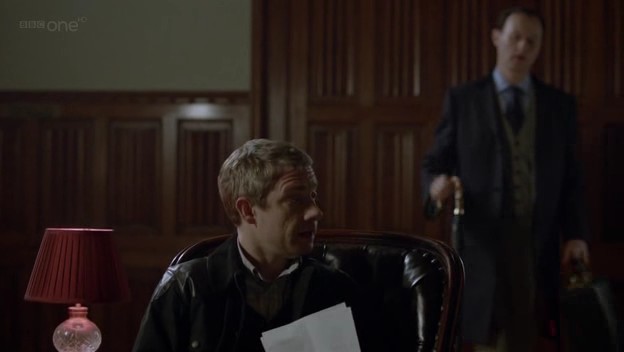
“Have you seen your brother’s address book lately?” asks Watson, having barged into Mycroft’s club, paper in hand. “Two names: yours and mine, and Moriarty didn’t get this stuff from me.”
“John,” begins Mycroft, imagining he’ll get a word in.
“So how does it work, then, your relationship? D’you go out for a coffee now and then, eh, you and Jim?” Mycroft opens his mouth, but Watson goes on. “Your own brother, and you blabbed about his entire life to this maniac.”
“I never inten…” Mycroft starts, stops, and then starts again, “I never dreamt—”
“So this…th-th-this…is what you were trying to tell me, isn’t it? Watch his back ’cause I’ve made a mistake.”
Real life brother versus biological brother—this fight was a long time coming and a joy to watch unfold. Meanwhile another key player gets in the game.
“You’re wrong, you know,” says Sherlock, taking Molly by surprise. “You do count. You’ve always counted and I’ve always trusted you. But you were right. I’m not okay.”
“Tell me what’s wrong,” she says.

“Molly, I think I’m going to die.”
“What do you need?”
“If I wasn’t everything that you think I am—everything that I think I am—would you still want to help me?” he asks.
“What do you need?”
“You.”
We’ve seen Sherlock afraid and this is not what it looks like. This is solemn and sincere and determined. But the ending was revealed in the beginning—Sherlock is dead. Of course this is also The Final Problem, so we know he’s not. But it has to look like he is and most of all it has to fool Watson. And whatever his plan is, its success or failure rests on Molly Hooper. Or you could say it relies on Sherlock realizing he has more friends than anyone would have thought, himself included. And that makes the story as far as I’m concerned. I love that everyone else has his or her theory on how Sherlock managed to fake his death—and the fact that, unlike the original Sherlock Holmes fans, we don’t have to wait ten years for our reunion—but for once the details are beside the point. Sherlock outmaneuvers Moriarty by proving to be a lot more human than your average sociopath.
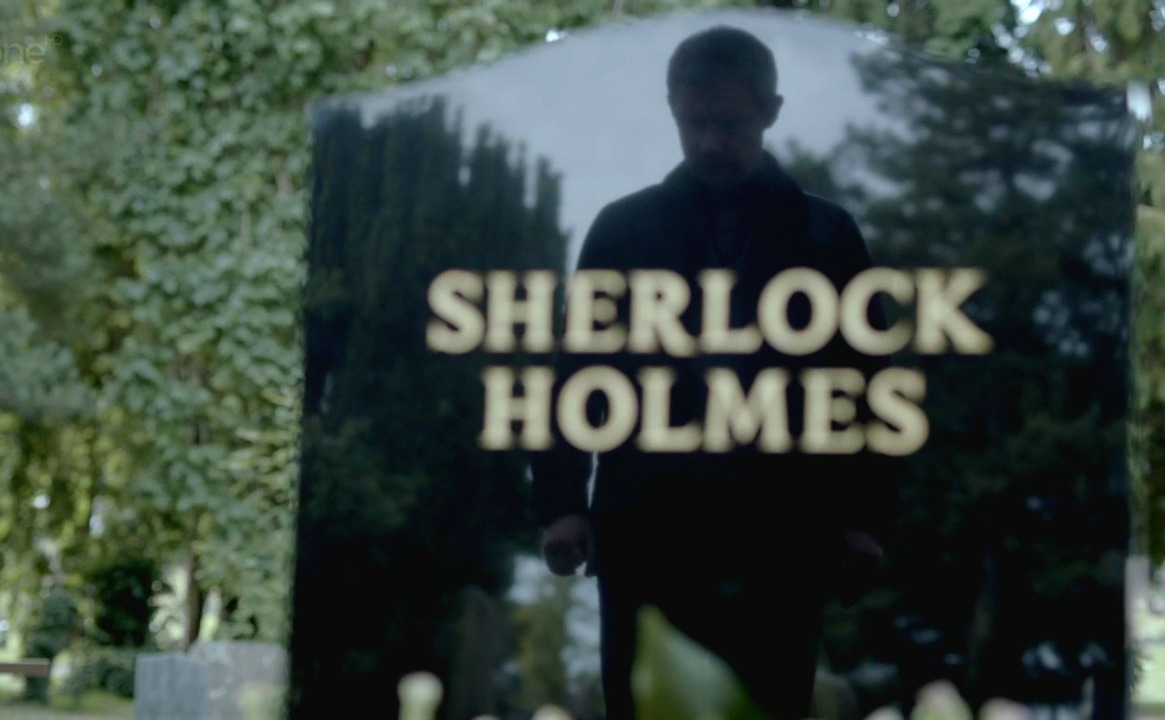
Speaking of headcases, I can’t think of another one I’ve been so sad to see go. All the other criminals were so obviously inferior they didn’t even rate a comparison. In the end he was truly peerless, so looking forward it’s hard to believe he’ll be topped. Oh how I will miss you, Moriarty…but you did go out with a bang.

